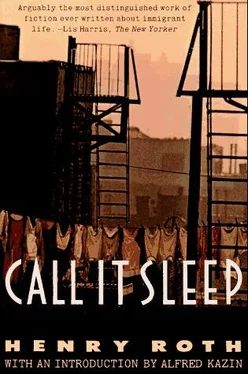“You’re sure? You — you saw nobody? Nothing that would frighten you?”
“I–I only saw the boys. And Yussie told them, and then they all began to — to chase me.”
“Of course. I’m glad there was nothing else. God knows that was enough!”
Her pace quickened again. Without eagerness, David singled out his own house among the dark ones. It struck him as odd that he should only have noticed now and at night that his house had a flat and not a gabled roof. They lived under the roof then, Yussie and Annie. Suppose Annie had looked out of the window when he made his mother look out in the police station. Suppose she was there now watching him! He shuddered, looked away.
“In our block, the first stores, Mama — the first stores begin.”
“Yes … And tell me, will I still have to stand in the hallway when you go down? Or have you seen how little there is to fear in cellars?”
“No!” Fear lunged within him. “No, Mama! You’ll have to wait — always!”
“How desperate you sound!”
“And I’m not going to play with — with anybody! Any more!”
“You’re not?”
“No! Never!”
He could feel his lips pouting despite himself, stretching out as if to loosen the tears. Another moment and he would have wept, but the hallway door was before him now, and now his mother pressed it open. Imperious terror dispersed his tears. He entered — thrust of warmth of the gaslit hallway, stagnant air suffused with the dusty, torpid odor of carpets. The cellar door was brown — closed again. For an instant he wondered whether he or another had shut it, but could not recall. Fear printed on his back and breast the cold, metallic squares of a wiry net. He shrank against his mother, clung to her till they mounted the carpeted stairs. She seemed not to have noticed.
“If he’s in,” she murmured aloud, “he’ll be distraught! After what I said to him last night! Hurry! He’ll think I’ve— But why not?” She appeared suddenly to remember. “Why won’t you play?”
“I don’t—” He faltered dully, evasively. “I don’t want to.” It no longer mattered.
She hurried up the stairs, tarried a moment at the landing till he reached her and then tried the door. Unlocked, it yielded — gave upon darkness. Alarm tightened her features. She entered.
“Albert!”
There was no answer … Only the soft shifting of embers in the stove. For a weird, spinning instant, David, lingering on the threshold, visualized his father gone, miraculously, forever gone.
“Albert!” She was groping toward the wall where the match-safe hung. “Albert!”
“Unh!” His startled groan came from the bedroom. “You? Genya!” For once his voice was stripped of harshness, stripped of pride, power, was nothing but a cry such as David might have uttered, alone in the dark, despairing. “Genya!”
“Oh! Thank God, you’re here!”
“Yes…” And the harshness returned and the inflexible pride, and the voice was again his father’s, awakened, surly. “Hmph! Where else would I be?”
She had struck a match and now she lit the mantle-light.
“I tried so hard to get back before you arrived! Were you worried?”
“I?” Deliberate, again, sardonic. “No … And so you decided to return did you? Even the fixed word wavers, eh? In the cold? In the empty streets at ni—”
“Return? Albert, what are you saying! I never went!” She hurried up the front room stairs. “Shut the door, David, darling! Take off your coat! Sit down!” She went inside. “I feared you’d think—!” And her voice was suddenly lowered.
David shed his coat, found a chair and listened morosely to the sounds in the bed-room. From the drift of the occasional words, snatches of phrases, exclamations that rose like crests above their low tones, he knew their conversation was not only about him, but about the night before. His mother was explaining, he guessed, where she had been, why she had gone. Of Luter, he could hear no mention made. He divined that no mention would be made. Finally, his father exclaimed in an impatient voice:
“Well, you’ve said enough! I take your word for it! That son of yours has to be watched day and night!”
“But it wasn’t his fault, Albert!”
“Mine then? Is that what you mean. Are you hinting that I’m to blame?”
“No! No! No! It’s the fault of no one! You’re right, there’s no more to say! Are you hungry?”
“Naturally.”
“I’ve made that veal the way you like it. And those shredded carrots. Do you want them to-night?”
“Hmm.”
David could hear her moving toward the frontroom, open the window. A few seconds later, she appeared, carrying two covered pots.
“To bed early to-night.” She came down, smiling solicitously. “To forget early.”
Silently, on stockinged feet, his father loomed into the threshold. His vest was unbuttoned, the neck-band of his shirt open on the pit of the strong, corded neck. Gripping the doorpost with lank, ink-spotted fingers, he blinked at the light, and then regarded David gloomily.
“And so you’re acquainted with the police now?”
David dropped his gaze. He hadn’t seen his father since last night when he was beaten. The face was still the face of a foe.
“Yes!” His mother laughed, looking round from the stove. “But in friendship only! Wait till I show you the cake they gave him. It’s in my pocket-book.”
“They gave him cake, eh?”
To David there was something peculiarly significant in the way his father uttered the words.
“Yes,” she continued cheerfully. “And how they must have laughed at my English!”
“How did you ever let him get so far? You’re always watching after him.”
“I don’t know. He was gone before I thought to look.”
“Hmm!” He glanced at David, reached for the newspaper on the table, became engrossed.
His mother lifted a bunch of carrots from a bag, dropped them into a dishpan and while she pared them, eyed David, fondly.
He was silent, met her gaze a moment and then vacantly tightened the table cloth against the table’s edge.
— Don’t believe Don’t believe. Don’t believe. Never!
XV
ON SUNDAY, David stayed in bed the whole morning, and then, dressed, spent the rest of the day in-doors. He had sneezed several times last night and again this morning, and what with his back aching — which David was sure ached for other reasons — his mother maintained that he might have caught a cold as a result of wandering through the streets. His father scoffed at the idea, but refrained from interfering. Although it meant having to be near his father all day, David was grateful not to have to face Yussie or Annie or the boy he pushed or anyone in fact. He clung to his mother or retreated to his bedroom, avoided the room his father was in, and in general, made himself as inconspicuous as possible. Toward evening, however, the dark forced him into the kitchen together with his father. Whereupon he fetched out his box of trinkets, found a corner least in the way, and sitting down on the linoleum floor, began constructing with the odds and ends that filled the box a zig-zag and precarious tower which his father’s or mother’s tread invariably sent toppling down.
During the late afternoon and even until supper-time, his father had several times confidently remarked that Luter would come to his senses, forego this folly of hunting for a wife and eventually appear at the table in time for the meal … However, though they waited almost an hour past the usual time, he never came. It was only when David’s mother began to complain mildly that half her cooking was over-done and the other half cold, that he gave up waiting, and shrugging his shoulders in brusque irritation, permitted her to serve the meal.
Читать дальше












